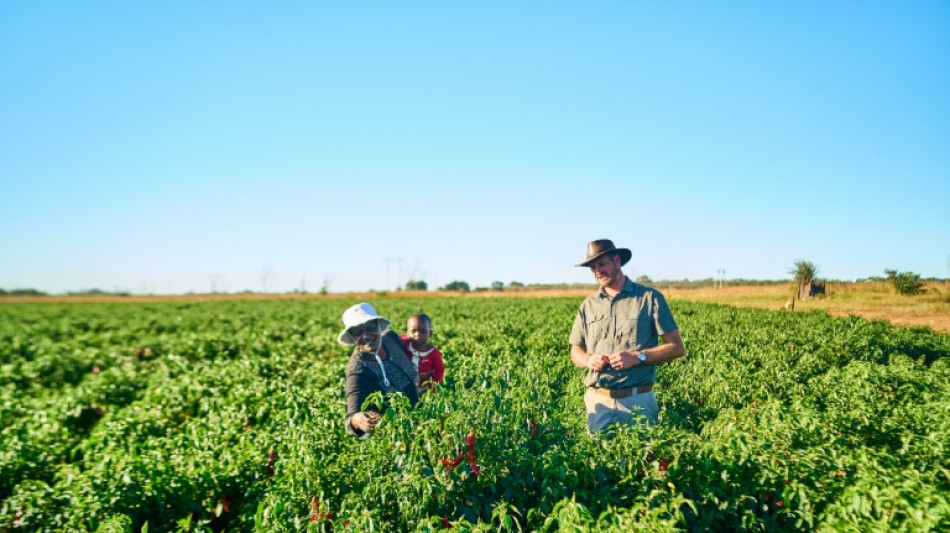
-
 Trump ramps up pressure on Democrats over US government shutdown
Trump ramps up pressure on Democrats over US government shutdown
-
Gauff says more Slam money 'important' for future of tennis

-
 Strange 'rogue' planet spotted guzzling matter like a star
Strange 'rogue' planet spotted guzzling matter like a star
-
Two dead, three wounded in UK synagogue attack

-
 Germany reviews warship order after delays
Germany reviews warship order after delays
-
Norris says Verstappen 'genuinely a challenger' as F1 title race hots up

-
 35 years later, beloved East German car still sputters on
35 years later, beloved East German car still sputters on
-
Japan's Arc hopes take a hit with poor draw, Minnie Hauk gets plum stall

-
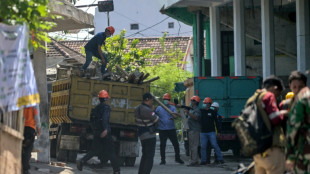 Rescuers say no more signs of life in rubble of collapsed Indonesian school
Rescuers say no more signs of life in rubble of collapsed Indonesian school
-
Barcelona's Camp Nou return delayed again

-
 Israel to deport Gaza flotilla activists
Israel to deport Gaza flotilla activists
-
Contepomi backs inexperienced Argentina playmakers against Springboks

-
 Four wounded, suspect shot in Manchester synagogue attack
Four wounded, suspect shot in Manchester synagogue attack
-
Depardieu sues French broadcaster over report that sped up downfall

-
 Zelensky warns Europe Russia looking to 'escalate' war
Zelensky warns Europe Russia looking to 'escalate' war
-
Spain hosts record number of summer tourists

-
 OpenAI valuation soars to $500 bn in private share sale: reports
OpenAI valuation soars to $500 bn in private share sale: reports
-
Argentina scrum-half Cruz to start against Springboks

-
 Formula One declares first official 'heat hazard' at Singapore GP
Formula One declares first official 'heat hazard' at Singapore GP
-
Germany recall Schlotterbeck but drop Fuellkrug for World Cup qualifiers

-
 Man City 'not good enough' for frustrated Haaland
Man City 'not good enough' for frustrated Haaland
-
Paris fans now watching fashion shows like sports games

-
 Gauff powers past unseeded Lys in straight sets for Beijing semis
Gauff powers past unseeded Lys in straight sets for Beijing semis
-
France prolongs detention of two from Russia 'shadow fleet' vessel

-
 Sinner primed for 'tough challenge' of defending Shanghai title
Sinner primed for 'tough challenge' of defending Shanghai title
-
Israel to deport intercepted Gaza flotilla activists

-
 Eddie Jones demands respect for Japan ahead of 'ambitious' tour
Eddie Jones demands respect for Japan ahead of 'ambitious' tour
-
Dutch warning over 'annoying' chatbots

-
 Markets surge on US rate hopes, tech fired by chip deal
Markets surge on US rate hopes, tech fired by chip deal
-
UK supermarket Tesco lifts profit outlook on competitive prices

-
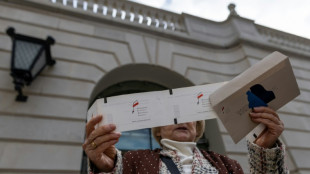 Young pianists vie for global glory in Poland's Chopin contest
Young pianists vie for global glory in Poland's Chopin contest
-
Robertson rallies All Blacks with Rugby Championship on the line

-
 Egyptian, Congolese contenders vie for UNESCO top job
Egyptian, Congolese contenders vie for UNESCO top job
-
Siraj on song as West Indies stumble to 90-5 in first India Test

-
 No more signs of life in Indonesia school collapse: rescuers
No more signs of life in Indonesia school collapse: rescuers
-
'Defect or be jailed': Turkey opposition mayors face new threat

-
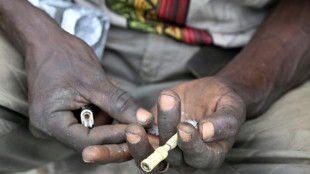 Addicts swap drug dens for support centre in Abidjan
Addicts swap drug dens for support centre in Abidjan
-
Afropop icon Adekunle Gold embraces Nigerian roots with new album

-
 Lithuania builds shelters as drones prowl border skies
Lithuania builds shelters as drones prowl border skies
-
Wallabies bench O'Connor for All Blacks Test as Slipper set for farewell

-
 Zelensky at European summit as EU seeks to bolster backing
Zelensky at European summit as EU seeks to bolster backing
-
Over a dozen Australian suncreams pulled over safety concerns

-
 Dodgers down Reds to advance in MLB playoffs, Yankees stay alive
Dodgers down Reds to advance in MLB playoffs, Yankees stay alive
-
Skipper Scott Barrett returns as All Blacks change six for Wallabies Test

-
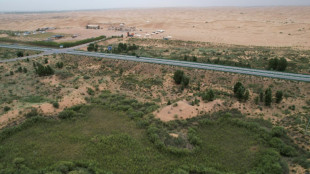 China's 'Great Green Wall' brings hope but also hardship
China's 'Great Green Wall' brings hope but also hardship
-
Let the 'Showgirl' era begin: Taylor Swift's new album is almost here

-
 Philippine quake death toll rises to 72
Philippine quake death toll rises to 72
-
Elon Musk halfway to becoming world's first trillionaire: report

-
 Surridge penalty lifts Nashville over Austin for US Open Cup
Surridge penalty lifts Nashville over Austin for US Open Cup
-
Trump jeopardising US role as scientific leader: Nobel officials


Zimbabwe's farmers push on as land grab compensation flounders
In a field of paprika plants in the heart of Zimbabwe, fourth-generation farmer Daniel Burger and relative newcomer Miriam Mupambawashe discuss the quality of the crop.
Burger, 36, and Mupambawashe, 59, are neighbours and partners in efforts to revive the country's once-flourishing agriculture sector cut down by a ruinous land reform drive in the 2000s.
The reform distributed land from the white minority, which still owned most of the best farmland 20 years after independence in 1980, to the black majority.
Around 4,000 white-owned farms were confiscated, some with deadly violence.
Mupambawashe was among thousands who received land. Though she initially knew little about farming, her small subsistence plot now thrives.
Other farms failed or were abandoned, with some new tenants unschooled in agriculture and others -- including politicians who were handed land -- uninterested.
There were food shortages and Zimbabwe soon required international aid.
"There was a bit of a tough period through the 2000s and, unfortunately, I think it sort of refuelled racial tensions to an extent," Burger told AFP.
"But being so passionate about farming was the motivator for me to move forward," he said.
- Good faith -
Mupambawashe moved to the area from the southern city of Bulawayo, around 200 kilometres (125 miles) away.
"When we first came here in 2001, it was a forest and there was nothing built," she said. "Some of the white farmers were angry but we managed to talk to each other in good faith and move forward."
"They never let us down and said, 'You grabbed the farm, let's see if you can do it'. But instead they brought their own tractors and equipment to come and help, which we felt was a nice gesture."
It was hard in the beginning, especially after irrigation equipment was stolen, and the early failures were "embarrassing", Mupambawashe said.
But today her plot does so well that she only needs to buy in sugar and cooking oil.
Burger leases land from her and lends tractors and expertise.
His family’s land was among the few hundreds that were not seized in the 2000s.
Nonetheless, "For a long time we became wound up in compensation," said Burger, vice-president of the Commercial Farmers Union of Zimbabwe (CFU) that represents mostly white farmers.
"But it wasn't our purpose. Our purpose was driving agriculture and current agricultural affairs forward," he said.
- Compensation frustration -
This year, some farm owners whose land was confiscated received the first compensation payments after decades of waiting.
The process has been complex and divisive.
The government committed to compensation as part of an effort to settle arrears and reform the economy in order to be able to regain access to international credit lines cut two decades ago.
It announced in 2020 the creation of a fund that would pay out US$3.5 billion for infrastructure on farms but not the land, which it says was taken by force by colonial settlers.
Unable to raise cash, the government in 2023 changed the offer to one percent in cash and the remainder in US dollar denominated treasury bonds.
In April, the first payments were made to 378 of 780 farmers approved for this scheme.
Deon Theron, who represents the Compensation Steering Committee group of former white farmers, says the introduction of the bonds has annulled the original deal and negotiations need to start over.
The bonds are "unsecured" and there is "limited recourse in the event of non-performance by government," he told AFP.
"The general feeling amongst the farmers is firstly frustration that after 20-odd years we still have not received anything," Theron said.
But the Property and Farm Compensation Association said its members would take what is on offer.
The bonds are under international guarantee, said leader Harry Orphanides, adding that "digging in" and seeking more from the government would be futile.
- Tenure -
Mupambawashe and Burger are encouraged by another major government announcement -- the granting of land ownership rights to beneficiaries of the 2000s land reform.
The tenure announced late last year replaces 99-year leases and means the new owners can deal with the property as they wish, including putting it up for sale.
"It makes us feel settled," Mupambawashe said. "No one could come and tell us to move off the land or take it away from us."
"It is just going to catapult us forward as a nation and an economy," Burger said. "We used to be the breadbasket of Africa and we lost it somewhat. But I just look at where we are now."
strs/br/ho/cw
R.Kloeti--VB
